Leadership: Theories, Social Work Alignment, and Framework
VerifiedAdded on 2020/11/12
|10
|3101
|260
Report
AI Summary
This report provides a comprehensive overview of leadership, exploring various leadership theories including trait, behavioral, and situational theories. It delves into the principles, ethics, values, and practices associated with these theories, and how they align with social work. The report examines how leadership concepts enhance and exemplify a leadership framework, discussing the importance of leading oneself, the organization, and people. It also incorporates relevant leadership literature to support the analysis. The report highlights the significance of leadership in motivating individuals to achieve common goals, emphasizing the definable and learnable nature of leadership skills. Furthermore, it explores the application of these theories in social work, focusing on how leaders can effectively influence and guide individuals within the field. The report concludes by emphasizing how leadership framework can be based on three key elements: leading yourself, leading the organization, and leading people.
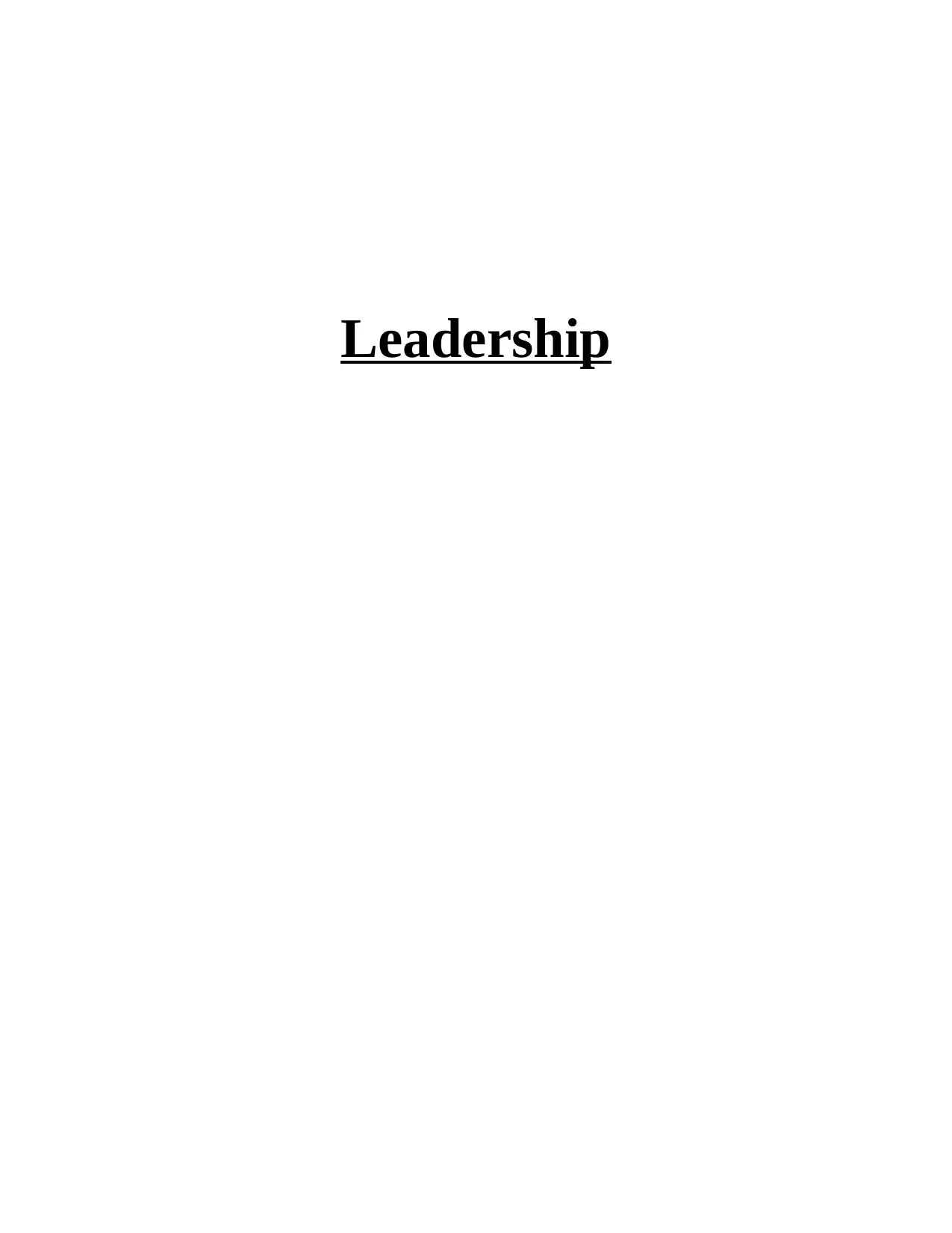
Leadership
Paraphrase This Document
Need a fresh take? Get an instant paraphrase of this document with our AI Paraphraser
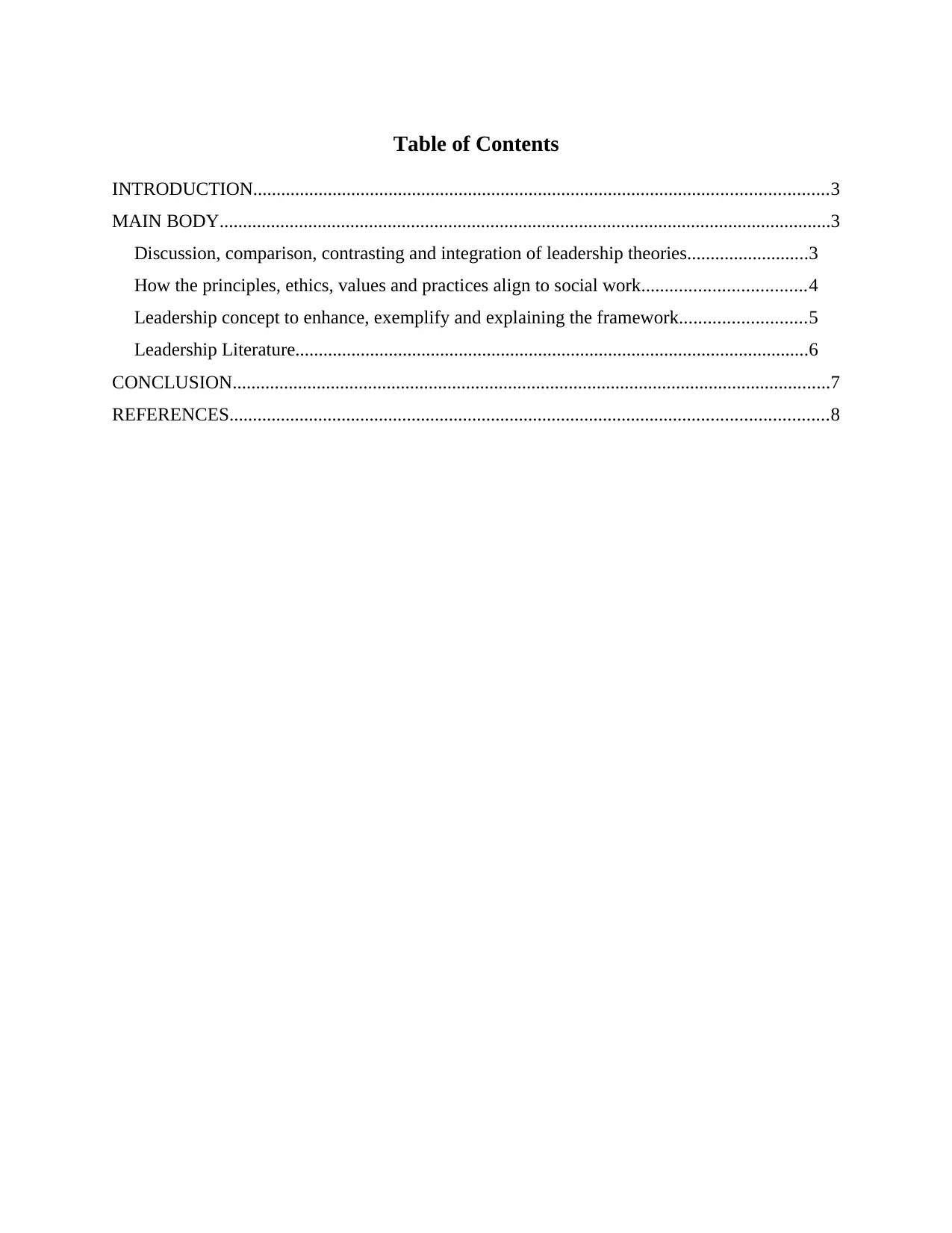
Table of Contents
INTRODUCTION...........................................................................................................................3
MAIN BODY...................................................................................................................................3
Discussion, comparison, contrasting and integration of leadership theories..........................3
How the principles, ethics, values and practices align to social work...................................4
Leadership concept to enhance, exemplify and explaining the framework...........................5
Leadership Literature..............................................................................................................6
CONCLUSION................................................................................................................................7
REFERENCES................................................................................................................................8
INTRODUCTION...........................................................................................................................3
MAIN BODY...................................................................................................................................3
Discussion, comparison, contrasting and integration of leadership theories..........................3
How the principles, ethics, values and practices align to social work...................................4
Leadership concept to enhance, exemplify and explaining the framework...........................5
Leadership Literature..............................................................................................................6
CONCLUSION................................................................................................................................7
REFERENCES................................................................................................................................8
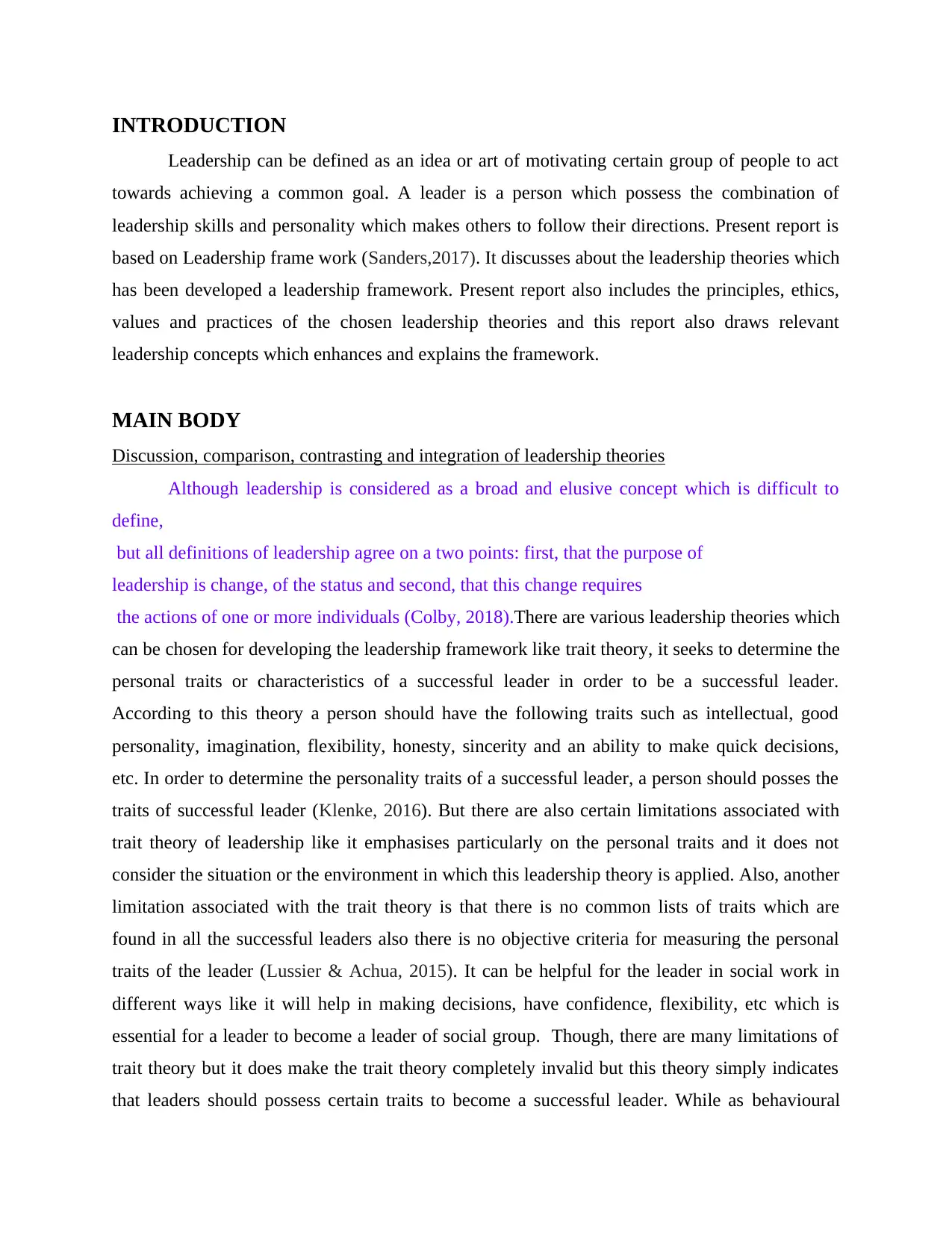
INTRODUCTION
Leadership can be defined as an idea or art of motivating certain group of people to act
towards achieving a common goal. A leader is a person which possess the combination of
leadership skills and personality which makes others to follow their directions. Present report is
based on Leadership frame work (Sanders,2017). It discusses about the leadership theories which
has been developed a leadership framework. Present report also includes the principles, ethics,
values and practices of the chosen leadership theories and this report also draws relevant
leadership concepts which enhances and explains the framework.
MAIN BODY
Discussion, comparison, contrasting and integration of leadership theories
Although leadership is considered as a broad and elusive concept which is difficult to
define,
but all definitions of leadership agree on a two points: first, that the purpose of
leadership is change, of the status and second, that this change requires
the actions of one or more individuals (Colby, 2018).There are various leadership theories which
can be chosen for developing the leadership framework like trait theory, it seeks to determine the
personal traits or characteristics of a successful leader in order to be a successful leader.
According to this theory a person should have the following traits such as intellectual, good
personality, imagination, flexibility, honesty, sincerity and an ability to make quick decisions,
etc. In order to determine the personality traits of a successful leader, a person should posses the
traits of successful leader (Klenke, 2016). But there are also certain limitations associated with
trait theory of leadership like it emphasises particularly on the personal traits and it does not
consider the situation or the environment in which this leadership theory is applied. Also, another
limitation associated with the trait theory is that there is no common lists of traits which are
found in all the successful leaders also there is no objective criteria for measuring the personal
traits of the leader (Lussier & Achua, 2015). It can be helpful for the leader in social work in
different ways like it will help in making decisions, have confidence, flexibility, etc which is
essential for a leader to become a leader of social group. Though, there are many limitations of
trait theory but it does make the trait theory completely invalid but this theory simply indicates
that leaders should possess certain traits to become a successful leader. While as behavioural
Leadership can be defined as an idea or art of motivating certain group of people to act
towards achieving a common goal. A leader is a person which possess the combination of
leadership skills and personality which makes others to follow their directions. Present report is
based on Leadership frame work (Sanders,2017). It discusses about the leadership theories which
has been developed a leadership framework. Present report also includes the principles, ethics,
values and practices of the chosen leadership theories and this report also draws relevant
leadership concepts which enhances and explains the framework.
MAIN BODY
Discussion, comparison, contrasting and integration of leadership theories
Although leadership is considered as a broad and elusive concept which is difficult to
define,
but all definitions of leadership agree on a two points: first, that the purpose of
leadership is change, of the status and second, that this change requires
the actions of one or more individuals (Colby, 2018).There are various leadership theories which
can be chosen for developing the leadership framework like trait theory, it seeks to determine the
personal traits or characteristics of a successful leader in order to be a successful leader.
According to this theory a person should have the following traits such as intellectual, good
personality, imagination, flexibility, honesty, sincerity and an ability to make quick decisions,
etc. In order to determine the personality traits of a successful leader, a person should posses the
traits of successful leader (Klenke, 2016). But there are also certain limitations associated with
trait theory of leadership like it emphasises particularly on the personal traits and it does not
consider the situation or the environment in which this leadership theory is applied. Also, another
limitation associated with the trait theory is that there is no common lists of traits which are
found in all the successful leaders also there is no objective criteria for measuring the personal
traits of the leader (Lussier & Achua, 2015). It can be helpful for the leader in social work in
different ways like it will help in making decisions, have confidence, flexibility, etc which is
essential for a leader to become a leader of social group. Though, there are many limitations of
trait theory but it does make the trait theory completely invalid but this theory simply indicates
that leaders should possess certain traits to become a successful leader. While as behavioural
⊘ This is a preview!⊘
Do you want full access?
Subscribe today to unlock all pages.

Trusted by 1+ million students worldwide
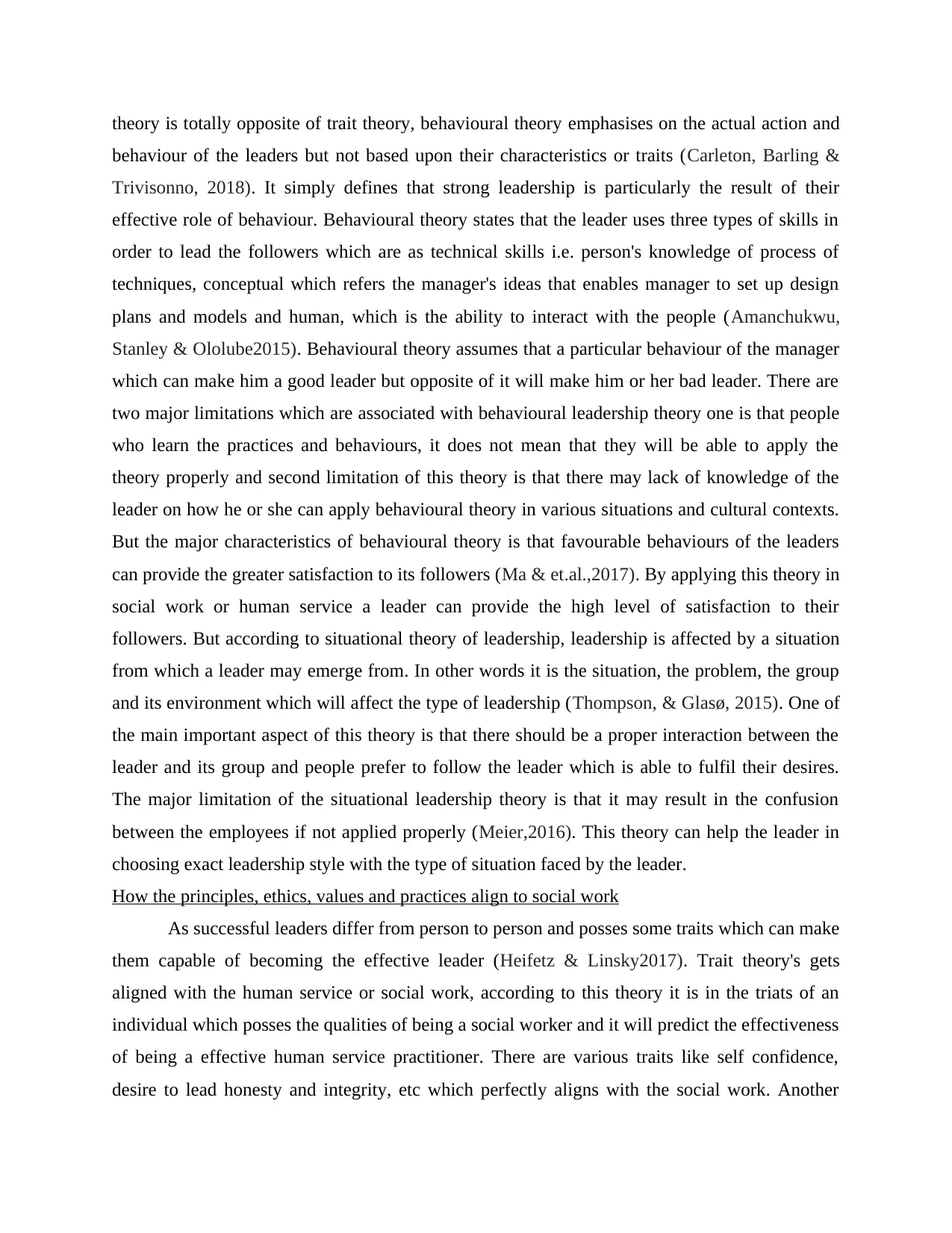
theory is totally opposite of trait theory, behavioural theory emphasises on the actual action and
behaviour of the leaders but not based upon their characteristics or traits (Carleton, Barling &
Trivisonno, 2018). It simply defines that strong leadership is particularly the result of their
effective role of behaviour. Behavioural theory states that the leader uses three types of skills in
order to lead the followers which are as technical skills i.e. person's knowledge of process of
techniques, conceptual which refers the manager's ideas that enables manager to set up design
plans and models and human, which is the ability to interact with the people (Amanchukwu,
Stanley & Ololube2015). Behavioural theory assumes that a particular behaviour of the manager
which can make him a good leader but opposite of it will make him or her bad leader. There are
two major limitations which are associated with behavioural leadership theory one is that people
who learn the practices and behaviours, it does not mean that they will be able to apply the
theory properly and second limitation of this theory is that there may lack of knowledge of the
leader on how he or she can apply behavioural theory in various situations and cultural contexts.
But the major characteristics of behavioural theory is that favourable behaviours of the leaders
can provide the greater satisfaction to its followers (Ma & et.al.,2017). By applying this theory in
social work or human service a leader can provide the high level of satisfaction to their
followers. But according to situational theory of leadership, leadership is affected by a situation
from which a leader may emerge from. In other words it is the situation, the problem, the group
and its environment which will affect the type of leadership (Thompson, & Glasø, 2015). One of
the main important aspect of this theory is that there should be a proper interaction between the
leader and its group and people prefer to follow the leader which is able to fulfil their desires.
The major limitation of the situational leadership theory is that it may result in the confusion
between the employees if not applied properly (Meier,2016). This theory can help the leader in
choosing exact leadership style with the type of situation faced by the leader.
How the principles, ethics, values and practices align to social work
As successful leaders differ from person to person and posses some traits which can make
them capable of becoming the effective leader (Heifetz & Linsky2017). Trait theory's gets
aligned with the human service or social work, according to this theory it is in the triats of an
individual which posses the qualities of being a social worker and it will predict the effectiveness
of being a effective human service practitioner. There are various traits like self confidence,
desire to lead honesty and integrity, etc which perfectly aligns with the social work. Another
behaviour of the leaders but not based upon their characteristics or traits (Carleton, Barling &
Trivisonno, 2018). It simply defines that strong leadership is particularly the result of their
effective role of behaviour. Behavioural theory states that the leader uses three types of skills in
order to lead the followers which are as technical skills i.e. person's knowledge of process of
techniques, conceptual which refers the manager's ideas that enables manager to set up design
plans and models and human, which is the ability to interact with the people (Amanchukwu,
Stanley & Ololube2015). Behavioural theory assumes that a particular behaviour of the manager
which can make him a good leader but opposite of it will make him or her bad leader. There are
two major limitations which are associated with behavioural leadership theory one is that people
who learn the practices and behaviours, it does not mean that they will be able to apply the
theory properly and second limitation of this theory is that there may lack of knowledge of the
leader on how he or she can apply behavioural theory in various situations and cultural contexts.
But the major characteristics of behavioural theory is that favourable behaviours of the leaders
can provide the greater satisfaction to its followers (Ma & et.al.,2017). By applying this theory in
social work or human service a leader can provide the high level of satisfaction to their
followers. But according to situational theory of leadership, leadership is affected by a situation
from which a leader may emerge from. In other words it is the situation, the problem, the group
and its environment which will affect the type of leadership (Thompson, & Glasø, 2015). One of
the main important aspect of this theory is that there should be a proper interaction between the
leader and its group and people prefer to follow the leader which is able to fulfil their desires.
The major limitation of the situational leadership theory is that it may result in the confusion
between the employees if not applied properly (Meier,2016). This theory can help the leader in
choosing exact leadership style with the type of situation faced by the leader.
How the principles, ethics, values and practices align to social work
As successful leaders differ from person to person and posses some traits which can make
them capable of becoming the effective leader (Heifetz & Linsky2017). Trait theory's gets
aligned with the human service or social work, according to this theory it is in the triats of an
individual which posses the qualities of being a social worker and it will predict the effectiveness
of being a effective human service practitioner. There are various traits like self confidence,
desire to lead honesty and integrity, etc which perfectly aligns with the social work. Another
Paraphrase This Document
Need a fresh take? Get an instant paraphrase of this document with our AI Paraphraser
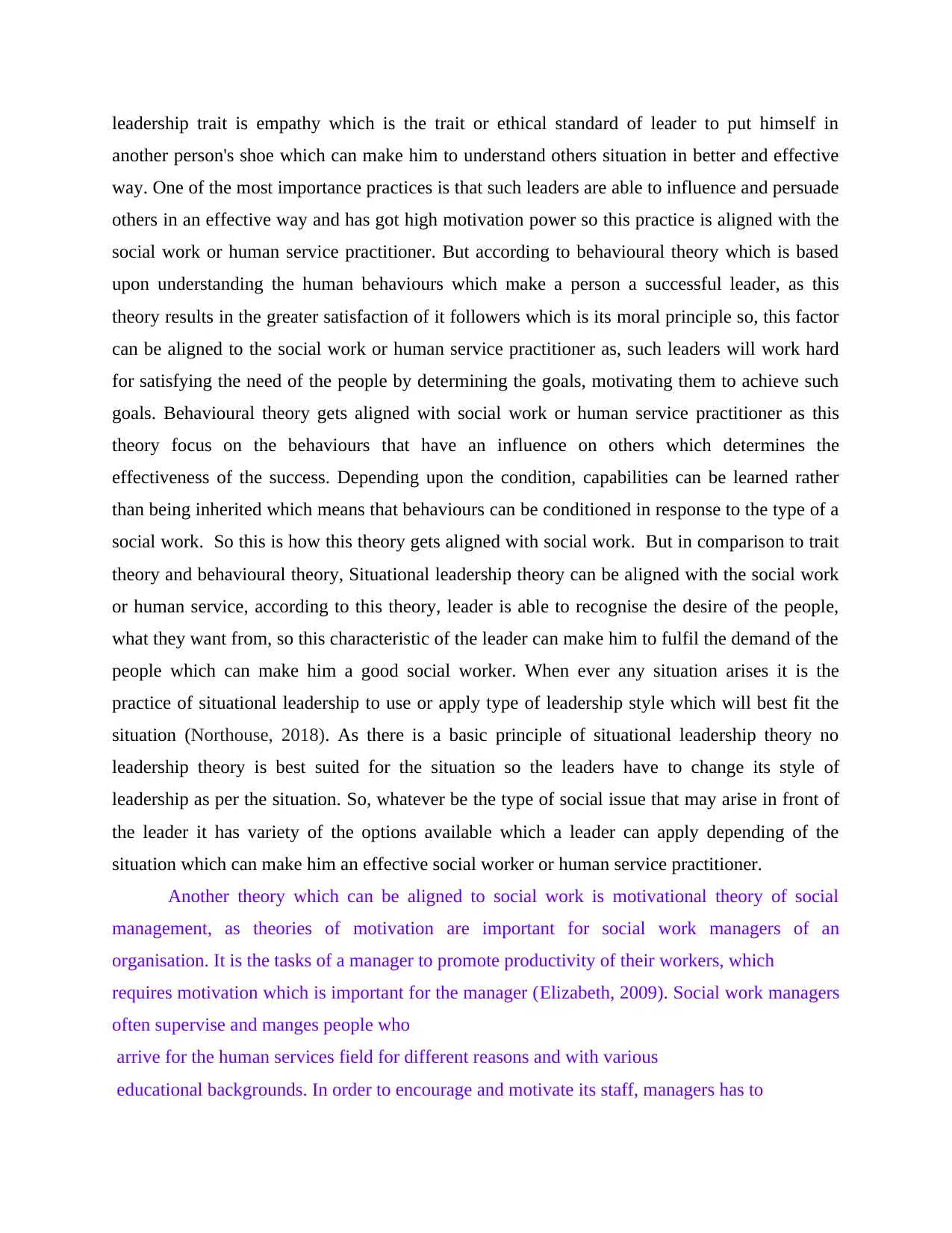
leadership trait is empathy which is the trait or ethical standard of leader to put himself in
another person's shoe which can make him to understand others situation in better and effective
way. One of the most importance practices is that such leaders are able to influence and persuade
others in an effective way and has got high motivation power so this practice is aligned with the
social work or human service practitioner. But according to behavioural theory which is based
upon understanding the human behaviours which make a person a successful leader, as this
theory results in the greater satisfaction of it followers which is its moral principle so, this factor
can be aligned to the social work or human service practitioner as, such leaders will work hard
for satisfying the need of the people by determining the goals, motivating them to achieve such
goals. Behavioural theory gets aligned with social work or human service practitioner as this
theory focus on the behaviours that have an influence on others which determines the
effectiveness of the success. Depending upon the condition, capabilities can be learned rather
than being inherited which means that behaviours can be conditioned in response to the type of a
social work. So this is how this theory gets aligned with social work. But in comparison to trait
theory and behavioural theory, Situational leadership theory can be aligned with the social work
or human service, according to this theory, leader is able to recognise the desire of the people,
what they want from, so this characteristic of the leader can make him to fulfil the demand of the
people which can make him a good social worker. When ever any situation arises it is the
practice of situational leadership to use or apply type of leadership style which will best fit the
situation (Northouse, 2018). As there is a basic principle of situational leadership theory no
leadership theory is best suited for the situation so the leaders have to change its style of
leadership as per the situation. So, whatever be the type of social issue that may arise in front of
the leader it has variety of the options available which a leader can apply depending of the
situation which can make him an effective social worker or human service practitioner.
Another theory which can be aligned to social work is motivational theory of social
management, as theories of motivation are important for social work managers of an
organisation. It is the tasks of a manager to promote productivity of their workers, which
requires motivation which is important for the manager (Elizabeth, 2009). Social work managers
often supervise and manges people who
arrive for the human services field for different reasons and with various
educational backgrounds. In order to encourage and motivate its staff, managers has to
another person's shoe which can make him to understand others situation in better and effective
way. One of the most importance practices is that such leaders are able to influence and persuade
others in an effective way and has got high motivation power so this practice is aligned with the
social work or human service practitioner. But according to behavioural theory which is based
upon understanding the human behaviours which make a person a successful leader, as this
theory results in the greater satisfaction of it followers which is its moral principle so, this factor
can be aligned to the social work or human service practitioner as, such leaders will work hard
for satisfying the need of the people by determining the goals, motivating them to achieve such
goals. Behavioural theory gets aligned with social work or human service practitioner as this
theory focus on the behaviours that have an influence on others which determines the
effectiveness of the success. Depending upon the condition, capabilities can be learned rather
than being inherited which means that behaviours can be conditioned in response to the type of a
social work. So this is how this theory gets aligned with social work. But in comparison to trait
theory and behavioural theory, Situational leadership theory can be aligned with the social work
or human service, according to this theory, leader is able to recognise the desire of the people,
what they want from, so this characteristic of the leader can make him to fulfil the demand of the
people which can make him a good social worker. When ever any situation arises it is the
practice of situational leadership to use or apply type of leadership style which will best fit the
situation (Northouse, 2018). As there is a basic principle of situational leadership theory no
leadership theory is best suited for the situation so the leaders have to change its style of
leadership as per the situation. So, whatever be the type of social issue that may arise in front of
the leader it has variety of the options available which a leader can apply depending of the
situation which can make him an effective social worker or human service practitioner.
Another theory which can be aligned to social work is motivational theory of social
management, as theories of motivation are important for social work managers of an
organisation. It is the tasks of a manager to promote productivity of their workers, which
requires motivation which is important for the manager (Elizabeth, 2009). Social work managers
often supervise and manges people who
arrive for the human services field for different reasons and with various
educational backgrounds. In order to encourage and motivate its staff, managers has to
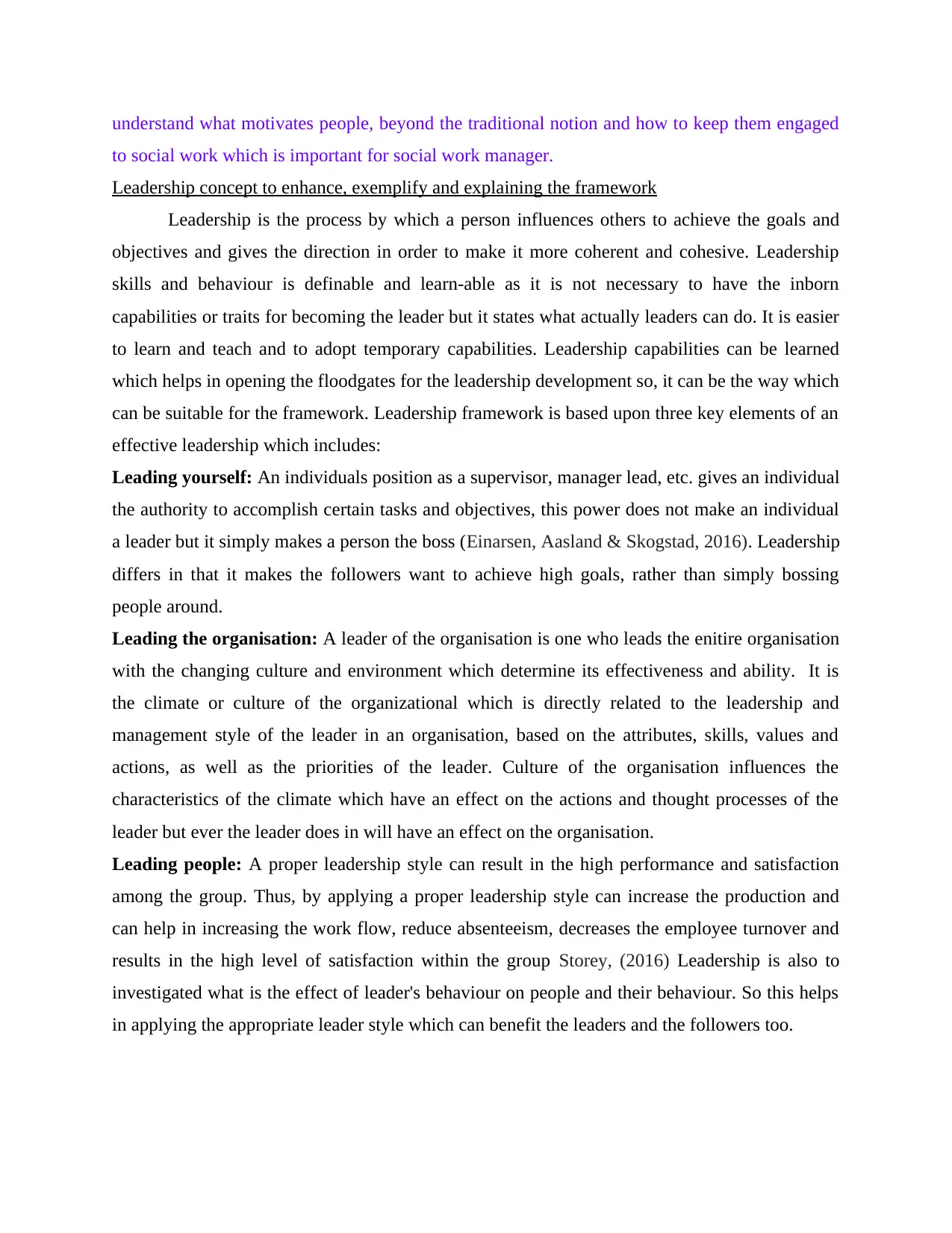
understand what motivates people, beyond the traditional notion and how to keep them engaged
to social work which is important for social work manager.
Leadership concept to enhance, exemplify and explaining the framework
Leadership is the process by which a person influences others to achieve the goals and
objectives and gives the direction in order to make it more coherent and cohesive. Leadership
skills and behaviour is definable and learn-able as it is not necessary to have the inborn
capabilities or traits for becoming the leader but it states what actually leaders can do. It is easier
to learn and teach and to adopt temporary capabilities. Leadership capabilities can be learned
which helps in opening the floodgates for the leadership development so, it can be the way which
can be suitable for the framework. Leadership framework is based upon three key elements of an
effective leadership which includes:
Leading yourself: An individuals position as a supervisor, manager lead, etc. gives an individual
the authority to accomplish certain tasks and objectives, this power does not make an individual
a leader but it simply makes a person the boss (Einarsen, Aasland & Skogstad, 2016). Leadership
differs in that it makes the followers want to achieve high goals, rather than simply bossing
people around.
Leading the organisation: A leader of the organisation is one who leads the enitire organisation
with the changing culture and environment which determine its effectiveness and ability. It is
the climate or culture of the organizational which is directly related to the leadership and
management style of the leader in an organisation, based on the attributes, skills, values and
actions, as well as the priorities of the leader. Culture of the organisation influences the
characteristics of the climate which have an effect on the actions and thought processes of the
leader but ever the leader does in will have an effect on the organisation.
Leading people: A proper leadership style can result in the high performance and satisfaction
among the group. Thus, by applying a proper leadership style can increase the production and
can help in increasing the work flow, reduce absenteeism, decreases the employee turnover and
results in the high level of satisfaction within the group Storey, (2016) Leadership is also to
investigated what is the effect of leader's behaviour on people and their behaviour. So this helps
in applying the appropriate leader style which can benefit the leaders and the followers too.
to social work which is important for social work manager.
Leadership concept to enhance, exemplify and explaining the framework
Leadership is the process by which a person influences others to achieve the goals and
objectives and gives the direction in order to make it more coherent and cohesive. Leadership
skills and behaviour is definable and learn-able as it is not necessary to have the inborn
capabilities or traits for becoming the leader but it states what actually leaders can do. It is easier
to learn and teach and to adopt temporary capabilities. Leadership capabilities can be learned
which helps in opening the floodgates for the leadership development so, it can be the way which
can be suitable for the framework. Leadership framework is based upon three key elements of an
effective leadership which includes:
Leading yourself: An individuals position as a supervisor, manager lead, etc. gives an individual
the authority to accomplish certain tasks and objectives, this power does not make an individual
a leader but it simply makes a person the boss (Einarsen, Aasland & Skogstad, 2016). Leadership
differs in that it makes the followers want to achieve high goals, rather than simply bossing
people around.
Leading the organisation: A leader of the organisation is one who leads the enitire organisation
with the changing culture and environment which determine its effectiveness and ability. It is
the climate or culture of the organizational which is directly related to the leadership and
management style of the leader in an organisation, based on the attributes, skills, values and
actions, as well as the priorities of the leader. Culture of the organisation influences the
characteristics of the climate which have an effect on the actions and thought processes of the
leader but ever the leader does in will have an effect on the organisation.
Leading people: A proper leadership style can result in the high performance and satisfaction
among the group. Thus, by applying a proper leadership style can increase the production and
can help in increasing the work flow, reduce absenteeism, decreases the employee turnover and
results in the high level of satisfaction within the group Storey, (2016) Leadership is also to
investigated what is the effect of leader's behaviour on people and their behaviour. So this helps
in applying the appropriate leader style which can benefit the leaders and the followers too.
⊘ This is a preview!⊘
Do you want full access?
Subscribe today to unlock all pages.

Trusted by 1+ million students worldwide
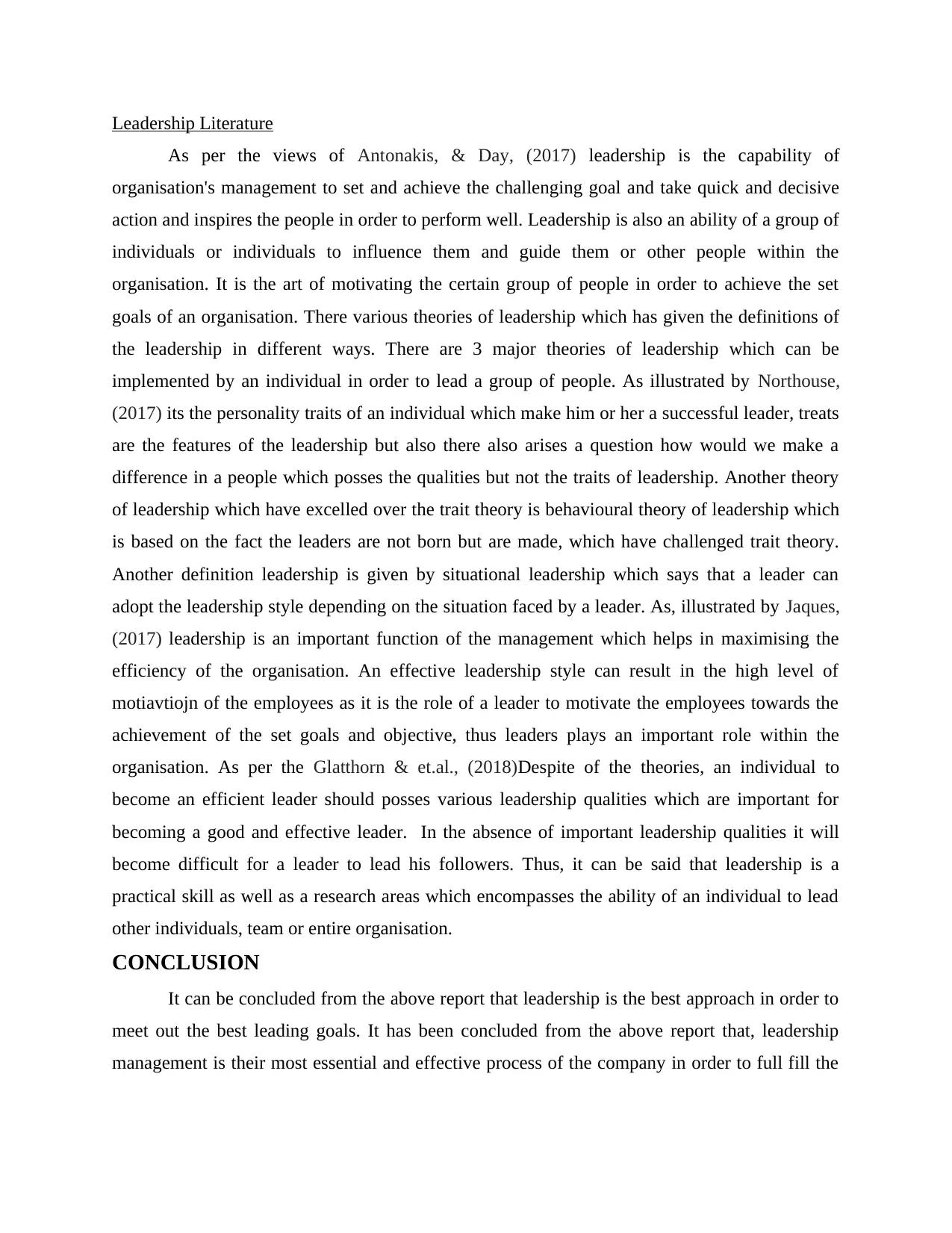
Leadership Literature
As per the views of Antonakis, & Day, (2017) leadership is the capability of
organisation's management to set and achieve the challenging goal and take quick and decisive
action and inspires the people in order to perform well. Leadership is also an ability of a group of
individuals or individuals to influence them and guide them or other people within the
organisation. It is the art of motivating the certain group of people in order to achieve the set
goals of an organisation. There various theories of leadership which has given the definitions of
the leadership in different ways. There are 3 major theories of leadership which can be
implemented by an individual in order to lead a group of people. As illustrated by Northouse,
(2017) its the personality traits of an individual which make him or her a successful leader, treats
are the features of the leadership but also there also arises a question how would we make a
difference in a people which posses the qualities but not the traits of leadership. Another theory
of leadership which have excelled over the trait theory is behavioural theory of leadership which
is based on the fact the leaders are not born but are made, which have challenged trait theory.
Another definition leadership is given by situational leadership which says that a leader can
adopt the leadership style depending on the situation faced by a leader. As, illustrated by Jaques,
(2017) leadership is an important function of the management which helps in maximising the
efficiency of the organisation. An effective leadership style can result in the high level of
motiavtiojn of the employees as it is the role of a leader to motivate the employees towards the
achievement of the set goals and objective, thus leaders plays an important role within the
organisation. As per the Glatthorn & et.al., (2018)Despite of the theories, an individual to
become an efficient leader should posses various leadership qualities which are important for
becoming a good and effective leader. In the absence of important leadership qualities it will
become difficult for a leader to lead his followers. Thus, it can be said that leadership is a
practical skill as well as a research areas which encompasses the ability of an individual to lead
other individuals, team or entire organisation.
CONCLUSION
It can be concluded from the above report that leadership is the best approach in order to
meet out the best leading goals. It has been concluded from the above report that, leadership
management is their most essential and effective process of the company in order to full fill the
As per the views of Antonakis, & Day, (2017) leadership is the capability of
organisation's management to set and achieve the challenging goal and take quick and decisive
action and inspires the people in order to perform well. Leadership is also an ability of a group of
individuals or individuals to influence them and guide them or other people within the
organisation. It is the art of motivating the certain group of people in order to achieve the set
goals of an organisation. There various theories of leadership which has given the definitions of
the leadership in different ways. There are 3 major theories of leadership which can be
implemented by an individual in order to lead a group of people. As illustrated by Northouse,
(2017) its the personality traits of an individual which make him or her a successful leader, treats
are the features of the leadership but also there also arises a question how would we make a
difference in a people which posses the qualities but not the traits of leadership. Another theory
of leadership which have excelled over the trait theory is behavioural theory of leadership which
is based on the fact the leaders are not born but are made, which have challenged trait theory.
Another definition leadership is given by situational leadership which says that a leader can
adopt the leadership style depending on the situation faced by a leader. As, illustrated by Jaques,
(2017) leadership is an important function of the management which helps in maximising the
efficiency of the organisation. An effective leadership style can result in the high level of
motiavtiojn of the employees as it is the role of a leader to motivate the employees towards the
achievement of the set goals and objective, thus leaders plays an important role within the
organisation. As per the Glatthorn & et.al., (2018)Despite of the theories, an individual to
become an efficient leader should posses various leadership qualities which are important for
becoming a good and effective leader. In the absence of important leadership qualities it will
become difficult for a leader to lead his followers. Thus, it can be said that leadership is a
practical skill as well as a research areas which encompasses the ability of an individual to lead
other individuals, team or entire organisation.
CONCLUSION
It can be concluded from the above report that leadership is the best approach in order to
meet out the best leading goals. It has been concluded from the above report that, leadership
management is their most essential and effective process of the company in order to full fill the
Paraphrase This Document
Need a fresh take? Get an instant paraphrase of this document with our AI Paraphraser
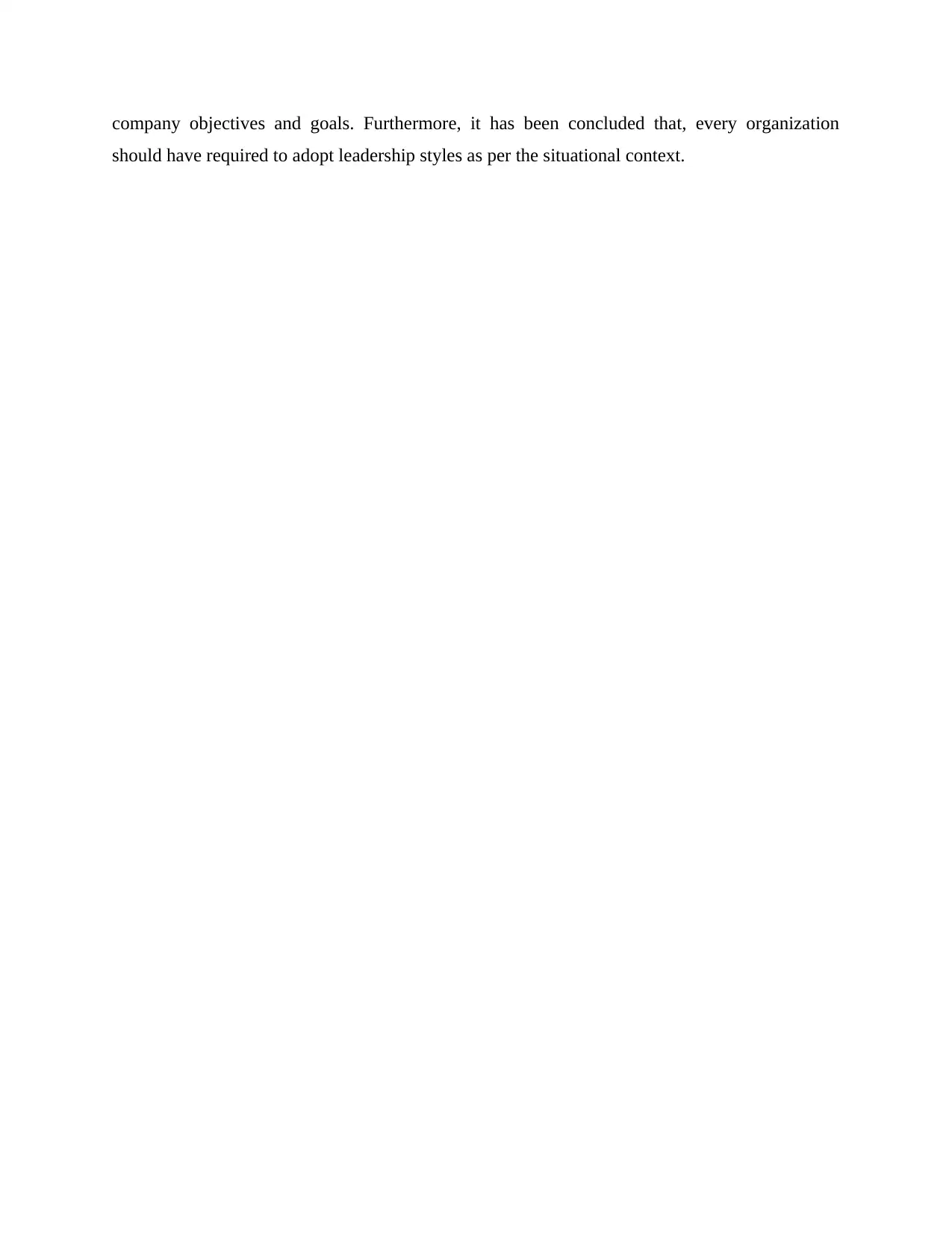
company objectives and goals. Furthermore, it has been concluded that, every organization
should have required to adopt leadership styles as per the situational context.
should have required to adopt leadership styles as per the situational context.
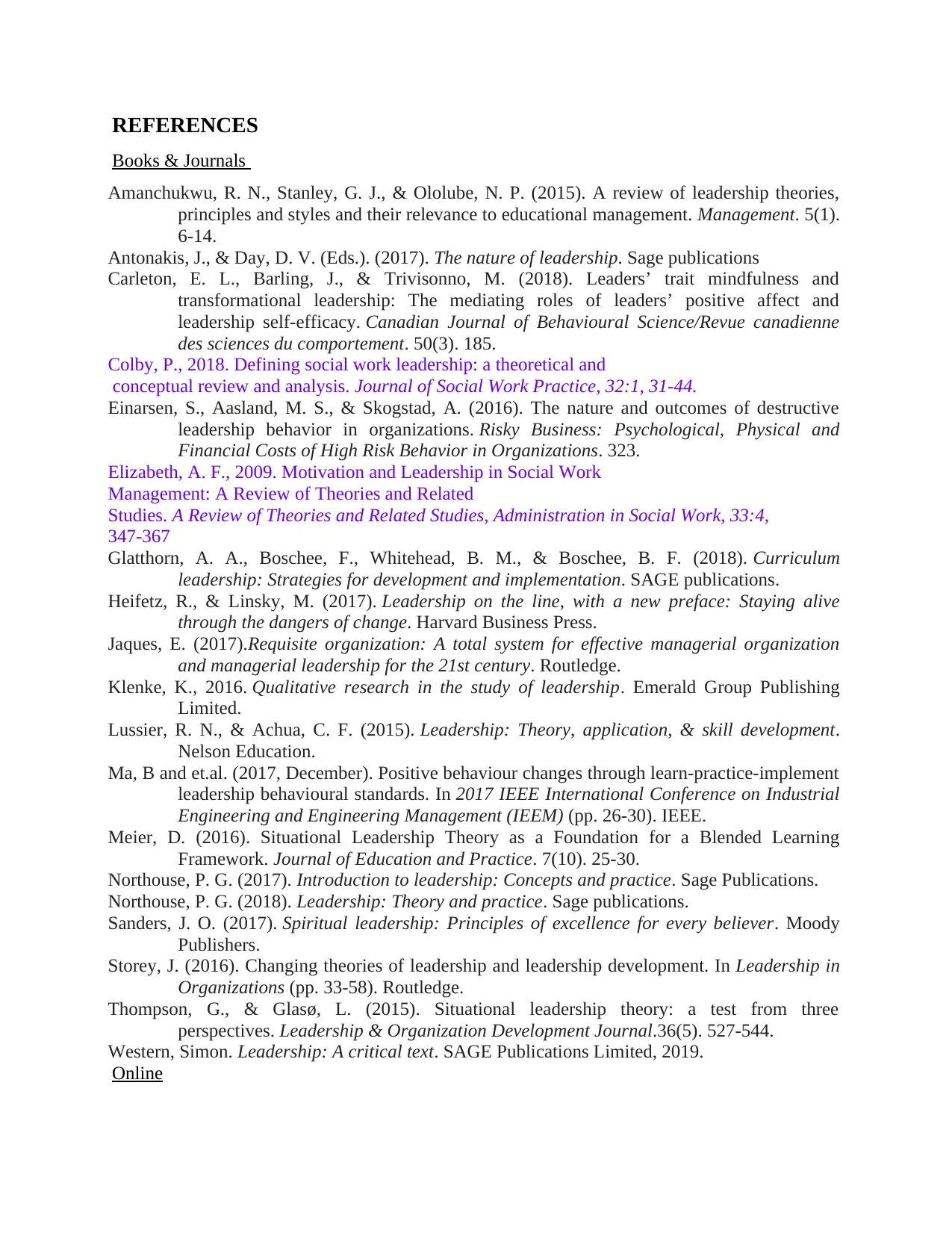
REFERENCES
Books & Journals
Amanchukwu, R. N., Stanley, G. J., & Ololube, N. P. (2015). A review of leadership theories,
principles and styles and their relevance to educational management. Management. 5(1).
6-14.
Antonakis, J., & Day, D. V. (Eds.). (2017). The nature of leadership. Sage publications
Carleton, E. L., Barling, J., & Trivisonno, M. (2018). Leaders’ trait mindfulness and
transformational leadership: The mediating roles of leaders’ positive affect and
leadership self-efficacy. Canadian Journal of Behavioural Science/Revue canadienne
des sciences du comportement. 50(3). 185.
Colby, P., 2018. Defining social work leadership: a theoretical and
conceptual review and analysis. Journal of Social Work Practice, 32:1, 31-44.
Einarsen, S., Aasland, M. S., & Skogstad, A. (2016). The nature and outcomes of destructive
leadership behavior in organizations. Risky Business: Psychological, Physical and
Financial Costs of High Risk Behavior in Organizations. 323.
Elizabeth, A. F., 2009. Motivation and Leadership in Social Work
Management: A Review of Theories and Related
Studies. A Review of Theories and Related Studies, Administration in Social Work, 33:4,
347-367
Glatthorn, A. A., Boschee, F., Whitehead, B. M., & Boschee, B. F. (2018). Curriculum
leadership: Strategies for development and implementation. SAGE publications.
Heifetz, R., & Linsky, M. (2017). Leadership on the line, with a new preface: Staying alive
through the dangers of change. Harvard Business Press.
Jaques, E. (2017).Requisite organization: A total system for effective managerial organization
and managerial leadership for the 21st century. Routledge.
Klenke, K., 2016. Qualitative research in the study of leadership. Emerald Group Publishing
Limited.
Lussier, R. N., & Achua, C. F. (2015). Leadership: Theory, application, & skill development.
Nelson Education.
Ma, B and et.al. (2017, December). Positive behaviour changes through learn-practice-implement
leadership behavioural standards. In 2017 IEEE International Conference on Industrial
Engineering and Engineering Management (IEEM) (pp. 26-30). IEEE.
Meier, D. (2016). Situational Leadership Theory as a Foundation for a Blended Learning
Framework. Journal of Education and Practice. 7(10). 25-30.
Northouse, P. G. (2017). Introduction to leadership: Concepts and practice. Sage Publications.
Northouse, P. G. (2018). Leadership: Theory and practice. Sage publications.
Sanders, J. O. (2017). Spiritual leadership: Principles of excellence for every believer. Moody
Publishers.
Storey, J. (2016). Changing theories of leadership and leadership development. In Leadership in
Organizations (pp. 33-58). Routledge.
Thompson, G., & Glasø, L. (2015). Situational leadership theory: a test from three
perspectives. Leadership & Organization Development Journal.36(5). 527-544.
Western, Simon. Leadership: A critical text. SAGE Publications Limited, 2019.
Online
Books & Journals
Amanchukwu, R. N., Stanley, G. J., & Ololube, N. P. (2015). A review of leadership theories,
principles and styles and their relevance to educational management. Management. 5(1).
6-14.
Antonakis, J., & Day, D. V. (Eds.). (2017). The nature of leadership. Sage publications
Carleton, E. L., Barling, J., & Trivisonno, M. (2018). Leaders’ trait mindfulness and
transformational leadership: The mediating roles of leaders’ positive affect and
leadership self-efficacy. Canadian Journal of Behavioural Science/Revue canadienne
des sciences du comportement. 50(3). 185.
Colby, P., 2018. Defining social work leadership: a theoretical and
conceptual review and analysis. Journal of Social Work Practice, 32:1, 31-44.
Einarsen, S., Aasland, M. S., & Skogstad, A. (2016). The nature and outcomes of destructive
leadership behavior in organizations. Risky Business: Psychological, Physical and
Financial Costs of High Risk Behavior in Organizations. 323.
Elizabeth, A. F., 2009. Motivation and Leadership in Social Work
Management: A Review of Theories and Related
Studies. A Review of Theories and Related Studies, Administration in Social Work, 33:4,
347-367
Glatthorn, A. A., Boschee, F., Whitehead, B. M., & Boschee, B. F. (2018). Curriculum
leadership: Strategies for development and implementation. SAGE publications.
Heifetz, R., & Linsky, M. (2017). Leadership on the line, with a new preface: Staying alive
through the dangers of change. Harvard Business Press.
Jaques, E. (2017).Requisite organization: A total system for effective managerial organization
and managerial leadership for the 21st century. Routledge.
Klenke, K., 2016. Qualitative research in the study of leadership. Emerald Group Publishing
Limited.
Lussier, R. N., & Achua, C. F. (2015). Leadership: Theory, application, & skill development.
Nelson Education.
Ma, B and et.al. (2017, December). Positive behaviour changes through learn-practice-implement
leadership behavioural standards. In 2017 IEEE International Conference on Industrial
Engineering and Engineering Management (IEEM) (pp. 26-30). IEEE.
Meier, D. (2016). Situational Leadership Theory as a Foundation for a Blended Learning
Framework. Journal of Education and Practice. 7(10). 25-30.
Northouse, P. G. (2017). Introduction to leadership: Concepts and practice. Sage Publications.
Northouse, P. G. (2018). Leadership: Theory and practice. Sage publications.
Sanders, J. O. (2017). Spiritual leadership: Principles of excellence for every believer. Moody
Publishers.
Storey, J. (2016). Changing theories of leadership and leadership development. In Leadership in
Organizations (pp. 33-58). Routledge.
Thompson, G., & Glasø, L. (2015). Situational leadership theory: a test from three
perspectives. Leadership & Organization Development Journal.36(5). 527-544.
Western, Simon. Leadership: A critical text. SAGE Publications Limited, 2019.
Online
⊘ This is a preview!⊘
Do you want full access?
Subscribe today to unlock all pages.

Trusted by 1+ million students worldwide
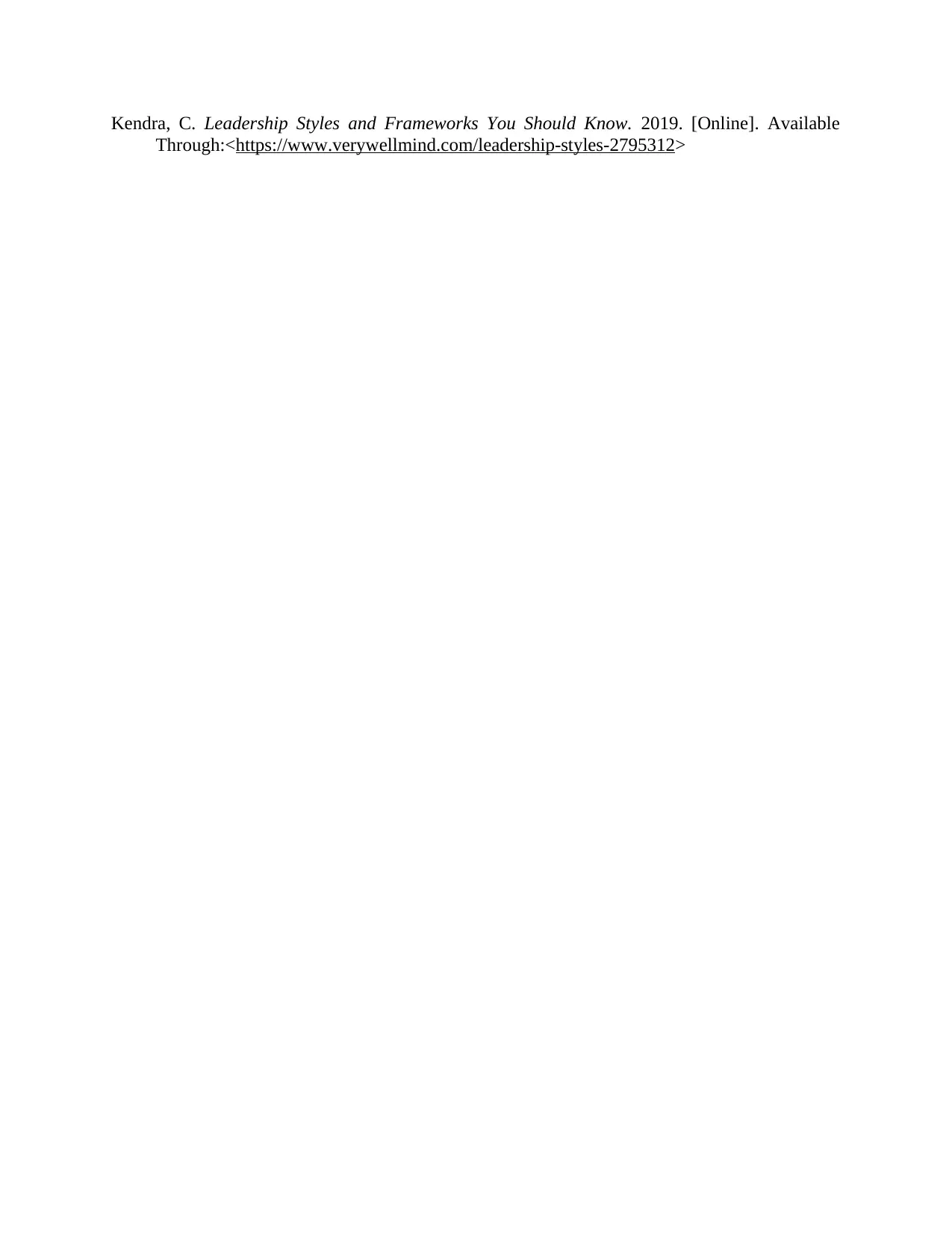
Kendra, C. Leadership Styles and Frameworks You Should Know. 2019. [Online]. Available
Through:<https://www.verywellmind.com/leadership-styles-2795312>
Through:<https://www.verywellmind.com/leadership-styles-2795312>
1 out of 10
Related Documents
Your All-in-One AI-Powered Toolkit for Academic Success.
+13062052269
info@desklib.com
Available 24*7 on WhatsApp / Email
![[object Object]](/_next/static/media/star-bottom.7253800d.svg)
Unlock your academic potential
Copyright © 2020–2026 A2Z Services. All Rights Reserved. Developed and managed by ZUCOL.




